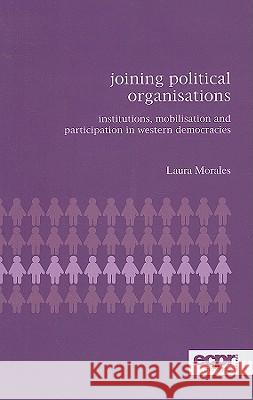Joining Political Organisations: Institutions, Mobilisation and Participation in Western Democracies » książka
Joining Political Organisations: Institutions, Mobilisation and Participation in Western Democracies
ISBN-13: 9780955248894 / Angielski / Miękka / 2009 / 264 str.
Joining Political Organisations: Institutions, Mobilisation and Participation in Western Democracies
ISBN-13: 9780955248894 / Angielski / Miękka / 2009 / 264 str.
(netto: 215,91 VAT: 5%)
Najniższa cena z 30 dni: 228,62
ok. 16-18 dni roboczych.
Darmowa dostawa!
From political parties to environmental organisations, citizens join a host of associations in order to influence policymaking and political agendas. Yet why in some western democracies do citizens join political organisations much more than in others? Drawing on a large number of cross-national surveys and data sets, Morales shows that huge cross-national variations in political membership are not so much related to social or attitudinal differences between these countries' citizens, but are explained to a great extent by the structure of the political system of each nation.
Political organisations and clubs structure contemporary politics. From political parties, to environmental organisations, citizens join a host of associations to influence policy-making and the political agenda. But, why do citizens join political organisations much more in some western democracies than in others? Laura Morales explains that there are three types of participatory patterns - a North American model, with extensive membership levels and a reasonably high level of activism within organisations; a northern, or Protestant, European pattern, that combines extensive membership levels and fundamentally passive involvement; and a south European model, where low levels of membership are compensated by intense activism. Drawing on a large number of cross-national surveys and datasets, Morales shows that huge cross-national variations in political membership are not so much related to social or attitudinal differences between these countries citizens, and are explained to a great extent by the structure of the political system of each nation.Laura Morales is a Research Fellow at the Institute for Social Change of the University of Manchester. She has previously taught Political Science and Research Methods at Universidad Autónoma de Madrid (2001-2003), Universidad Complutense de Madrid (2003), and the Universidad de Murcia (2003-2007). She was awarded with the ECPR and the Spanish Political Science Association prizes for the best Ph.D. thesis in 2004. Her interests lie, especially, in the areas of electoral behaviour, political participation, and comparative politics. She has published extensively on associational involvement, political participation, and political parties.This is a major and ambitious study. Laura Morales ... manages to effect a broad ranging cross-national comparison, as well as an over-time analysis, yielding a host of valuable insights into the causes and implications of political membership. Peter Mair











